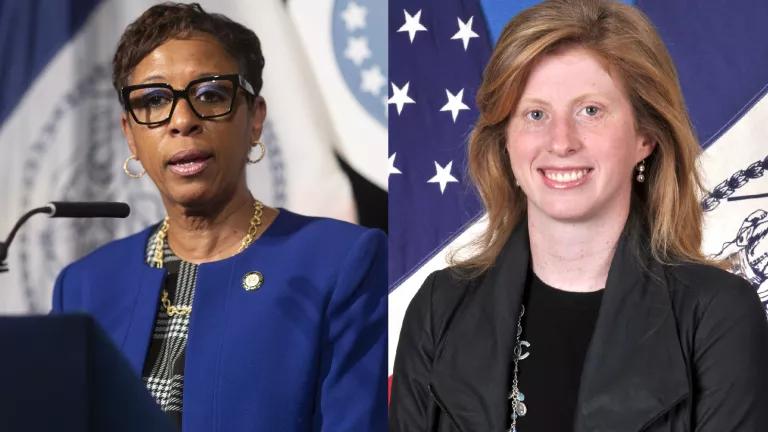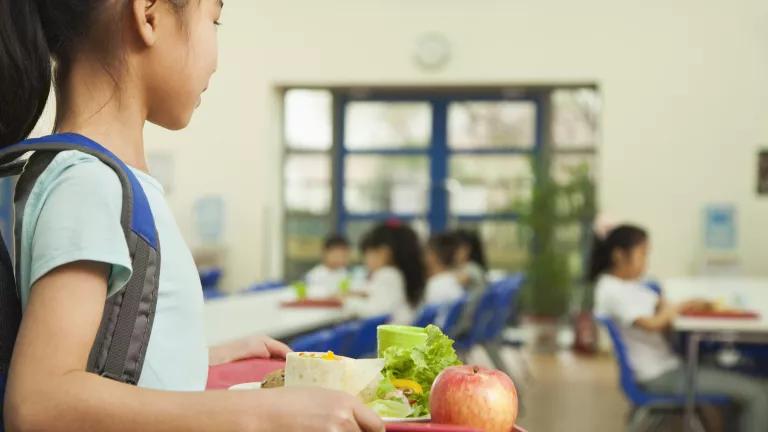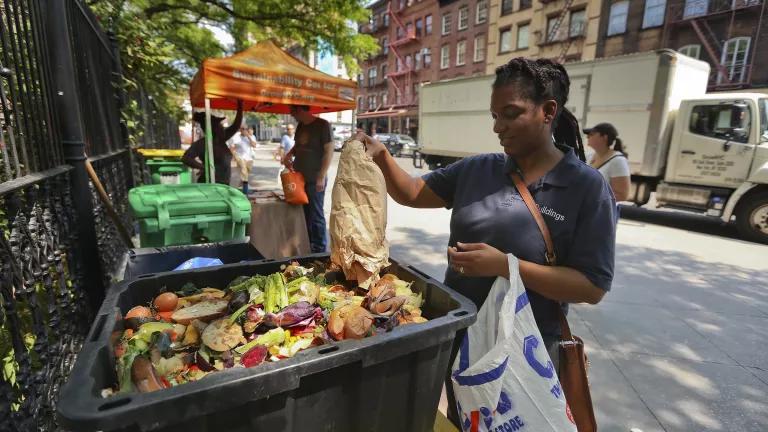NYC City Council Saves Community Composting
Reinvigorating this organics waste strategy will curb methane emissions, advance neighborhood revitalization, and protect environmental health.

Finished compost -- processed by groups like Big Reuse, LES Ecology Center, Earth Matter and the city’s botanical gardens -- helps NYC’s street trees, urban gardens and house plants thrive.
Photo credit: Courtesy of Big Reuse.
New York City’s just-adopted final FY ’25 budget allocates $6.2 million to support a reenergized community composting program in the nation’s largest city.
The monies will fund non-profit organizations from all five boroughs who will spearhead neighborhood efforts to turn food scraps, yard waste and food soiled paper into useful finished compost and help teach residents, school children and businesses how to compost and why it’s important to do so.
The City Council has thrown a lifeline to 15 diligent and dynamic non-profit groups that can play a transformative role in how New York handles thousands of tons a day of organic waste – still the most problematic waste disposal challenge facing New York.
New York City Council Speaker Adrienne Adams, Sanitation Committee Chair Shaun Abreu and their council colleagues rescued this program after the administration of Mayor Eric Adams had proposed to eliminate funding for community composting.
The Council’s leadership on this issue is another important step on the road to making the city’s entire waste program more sustainable.

This year’s NYC Budget Environmental Heroes: Speaker Adrienne Adams, Councilmember Shaun Abreu and their colleagues jumped in to rescue community composting – an essential strategy on the urban environmental health and sustainable living agenda.

Councilmember Shaun Abreu
Food scraps, yard waste and food-soiled paper represent the single largest portion of the municipal waste stream – as much as 4,000 tons a day just from residents and institutions like the city’s public schools.
The overwhelming bulk of this waste is currently shipped to out-of-city landfills or incinerators, generating global warming emissions and localized pollution, often in already overburdened environmental justice communities. Indeed, landfills are the third largest source of methane emissions in the United States. Keeping organics out of landfills is essential to curbing New York’s climate-disrupting discharges, as required by State and city law.
In contrast, when these organic materials are instead transformed into finished compost, they become natural fertilizers and soil enhancers that can help crops, street trees, rain gardens and house plants to grow.
Last year, the City Council, as part of its Zero Waste package of legislation, passed a bill requiring the Department of Sanitation to provide curbside collection of separated organics to every city household by October 2024.
While that mandate represents a milestone, curbside collections alone will not achieve widespread participation without an intensive, comprehensive public education and training program. And the 15 community composting non-profits slated to receive council funding are the key to success.
The groups participating in the revamped community composting program will undertake wide-ranging activities to build public understanding and support for organics separation and compost processing. Among other things, they will operate neighborhood compost processing operations; train “master composters” for green jobs; work in the city’s public schools to teach kids how and why to compost; assist community gardeners who want to process organics at the own facilities; distribute finished compost to neighborhood tree-keepers and residents; and assist in educating all New Yorkers about how this strategy advances environmental health and can save taxpayer dollars vs. landfilling and incineration. Several groups will bring composting education to residents in New York City Housing Authority developments; others will hopefully be working with restaurants and other businesses to boost composting of commercial trash as well.

Teaching kids how to compost and why it’s important is part of the mission of groups like Cafeteria Culture and GrowNYC that are getting FY’25 funds from the City Council.
Cafeteria Culture
The Council’s budget document, called Schedule C, identifies the following groups for community compost funding: BK Rot, Inc.; Brooklyn Botanic Garden Corp.; Brotherhood Sister Sol, Inc.; Council on the Environment – Grow NYC; Cypress Hills Local Development Corp.; Earth Matter NY, Inc; Fund for the City of New York, Inc. – Cafeteria Culture; Outstanding Renewal Enterprises – Lower East Side Ecology Center; Queens Botanical Garden Society, Inc.; Red Hook Initiative, Inc. – Red Hook Farms; and Snug Harbor Cultural Center & Botanical Garden. We understand that Big Reuse and GreenFeen OrganiX will also receive funding from the allocated funds.
A major new task for the community composting non-profits will be to take on the challenge of boosting public participation in the new curbside organics collection program that is now being rolled out by the Department of Sanitation.
Another change in the program will be the absence of food scrap drop-off sites at the GrowNYC Greenmarkets. Presumably, most New Yorkers will find the curbside program even more convenient. Additionally, we hope that some community gardens may agree to serve as food scrap drop-off and compost processing sites for neighborhood residents.
Ultimately, for New York City to become a national model for sustainability in the waste arena, it will be necessary for community composting groups and the Department of Sanitation to work together. The Department’s curbside organics collections won’t achieve sufficient public participation without the hands-on education and training programs that the community composters can provide. And the community composting groups will need support from the Department to maximize their effectiveness. We look forward to working with Sanitation Commissioner Jessica Tisch to rebuild this partnership.
The City Council’s budget rescue of community composting, combined with its passage of the curbside organics collection law last June, sets the stage for a new era in organics waste handling in New York. It’s one of the most exciting environmental health and climate protection developments to take place here over the past twelve months.
This blog provides general information, not legal advice. If you need legal help, please consult a lawyer in your state.



